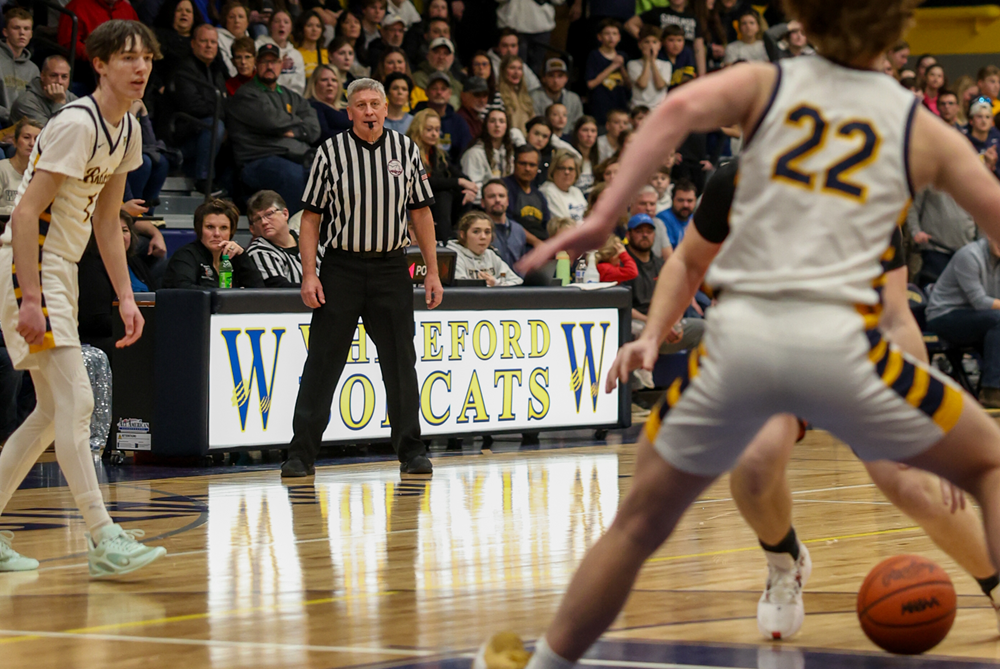
Sullivan Returns to Court After Coaching, Sees Game In New Ways as Official
By
Doug Donnelly
Special for MHSAA.com
February 6, 2024
Gary Sullivan is getting a whole new perspective on basketball.
 After 25 years of coaching the game on several levels – including the last six as the boys varsity coach at Blissfield Community Schools – Sullivan has replaced his school logo with stripes and a whistle. He’s enjoying his second basketball career, this time as a referee.
After 25 years of coaching the game on several levels – including the last six as the boys varsity coach at Blissfield Community Schools – Sullivan has replaced his school logo with stripes and a whistle. He’s enjoying his second basketball career, this time as a referee.
“I’m having a good time,” said Sullivan, who will retire this month as a teacher at Blissfield. “I’ve had fantastic experiences so far. I hope it stays that way.”
Sullivan is an Ohio native, having grown up just across the state line and attended Evergreen High School. After graduating from the University of Toledo, he landed a teaching job at Blissfield. Early on, he took a stab at officiating basketball.
“(Former Blissfield baseball coach) Larry Tuttle got me into it,” he said. “I did a few middle school and some junior varsity games. Then, when I became an athletic director pretty early in my career, I gave officiating up.”
He started coaching along the way, from youth sports to middle school basketball. He took over as the Blissfield varsity coach in 2016-17
After winning seven games over two seasons with an experienced roster, Blissfield rebounded with 12 wins in 2018-19 and 19 in 2019-20 – the most for Blissfield since 1992.
The Royals won Lenawee County Athletic Association and Division 2 District titles in 2021. The LCAA title was the first for the Royals since 2003, and the District championship was the first for the school since 2004. He won 60 games in all and earned two county Coach of the Year awards.
He stepped down as basketball coach two years ago.
It wasn’t long and he was being courted to help tackle the referee shortage in Michigan and across the country. His brother, Terry, is a basketball official in the Jackson area.
“When I was finished coaching, I started thinking about it again,” Sullivan said. “My brother does a ton of officiating in the Jackson area. He told me, ‘Just do it. It will be fun. What else are you going to do in the middle of the winter? You might as well referee.’ It gives you a chance to still be involved in the game.”
Initially, Sullivan figured he’d officiate a few middle school and junior varsity games. Once he got his feet wet and adjusted to life with the whistle, however, he was hooked.
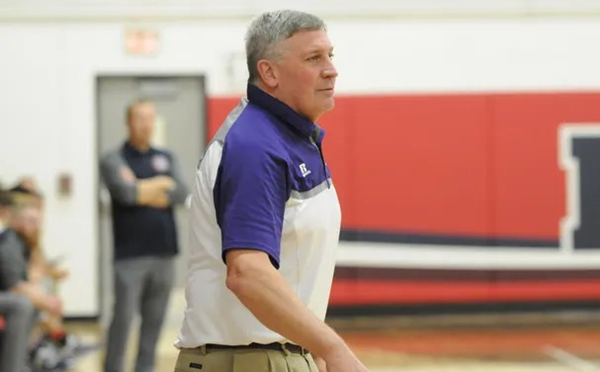 “Last year was my first year – that was my intention, do middle school and some JV, maybe a couple of days a week,” he said. “Before I knew it, they were assigning me games left and right. The more I did it, the more I liked it. By the end of the year, they had the chance to assign a couple of varsity games. No one complained too awful bad, and they gave me a few more.”
“Last year was my first year – that was my intention, do middle school and some JV, maybe a couple of days a week,” he said. “Before I knew it, they were assigning me games left and right. The more I did it, the more I liked it. By the end of the year, they had the chance to assign a couple of varsity games. No one complained too awful bad, and they gave me a few more.”
With his basketball background, Sullivan found being a referee an outlet for his competitive nature.
“Being around basketball has made it much easier for me than someone who just comes in and, ‘Hey, I’ll try to do this,’ he said. “You are competing with yourself a little to make the right call and keep the game flowing along.”
There have been a few unexpected moments in the transition from coach to referee.
For one, Sullivan said, being on the court is a completely different perspective than being on the sidelines.
“It is so much faster when you have to run and follow that person than it is when you sit there and watch it,” Sullivan said. “When you have to run, get to your primary spot, then keep the peripheral vision going to watch everything, it's much faster, more difficult than I ever anticipated.”
Sullivan said certain aspects of the game are different, too.
“As a coach, I always anticipated what I thought was going to happen,” he said. “In your mind you know someone is going to travel, then as soon as they travel, you are yelling ‘Travel!’ As an official, it is better to be a second late and be correct than a second early and be wrong.
“To me, the toughest transition has been to slow down, wait for the actual play to let itself run its course. Make sure it really was a foul. Think about it. Don’t get in a rush to make the call.”
He’s grateful to other area officials who have helped him learn the tricks of the trade during either formal training sessions or by example. He’s had the chance to review some of his games on film, which has helped him dissect the game from a new angle. He’s also learned from coaching to block out fans and people from the crowd who might disagree with a call.
“I have not had a negative experience yet from a fan,” he said. “As a former coach, I put myself on double probation – I dished out enough that maybe I’m a little more tolerant than some other officials. That’s just my personality at this point.”
This year Sullivan has had a full schedule of middle school games plus about a dozen girls varsity basketball games and a handful of boys varsity games. The most recent was Friday in Ottawa Lake in front of a big crowd watching rivals Whiteford and Summerfield.
“That was a ton of fun – full house, competitive game. I was glad to be a part of it,” Sullivan said.
There’s another bonus to being an official. When the game is over, he can go home and sleep. No more late nights watching film or scouting for the upcoming opponent.
“My cats are much happier,” he said. “I’m not waking up at 4:30 in the morning and watching a film, then going back to bed. It’s fun. I’m enjoying it.”
 Doug Donnelly has served as a sports and news reporter and city editor over 25 years, writing for the Daily Chief-Union in Upper Sandusky, Ohio from 1992-1995, the Monroe Evening News from 1995-2012 and the Adrian Daily Telegram since 2013. He's also written a book on high school basketball in Monroe County and compiles record books for various schools in southeast Michigan. E-mail him at [email protected] with story ideas for Jackson, Washtenaw, Hillsdale, Lenawee and Monroe counties.
Doug Donnelly has served as a sports and news reporter and city editor over 25 years, writing for the Daily Chief-Union in Upper Sandusky, Ohio from 1992-1995, the Monroe Evening News from 1995-2012 and the Adrian Daily Telegram since 2013. He's also written a book on high school basketball in Monroe County and compiles record books for various schools in southeast Michigan. E-mail him at [email protected] with story ideas for Jackson, Washtenaw, Hillsdale, Lenawee and Monroe counties.
PHOTOS (Top) Official Gary Sullivan monitors the action while working a boys basketball game at Ottawa Lake Whiteford. (Middle) Sullivan directs his team from the sideline during his tenure as Blissfield’s boys basketball coach. (Top photo by Mike Doughty; middle photo courtesy of the Adrian Daily Telegram.)
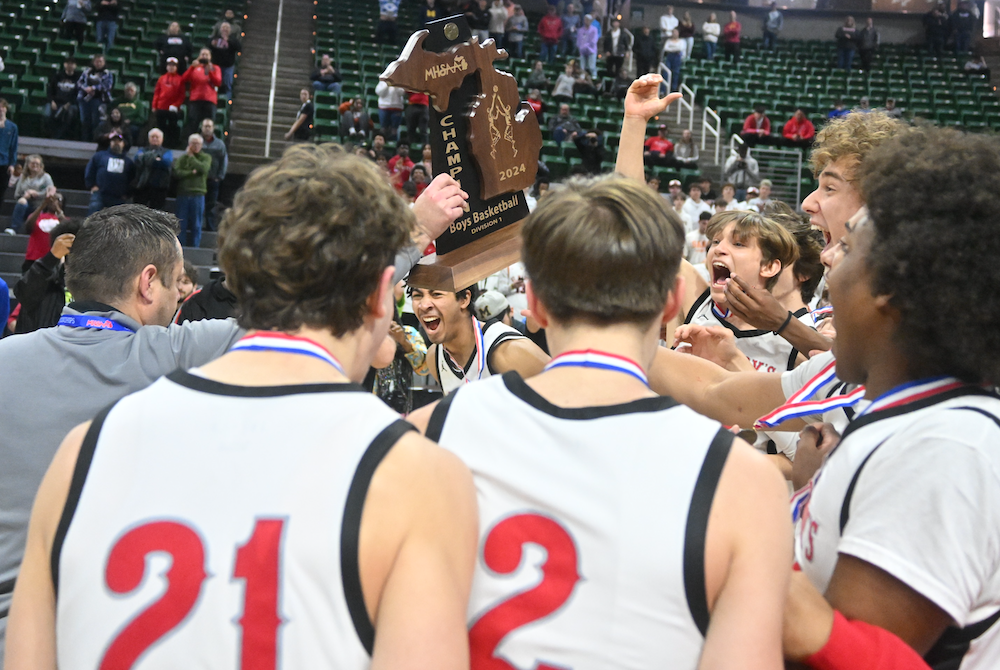
McKenney Grows Legend in Leading St. Mary's to 1st Title since 2000
By
Keith Dunlap
Special for MHSAA.com
March 16, 2024
EAST LANSING — At one point early in the fourth quarter of Saturday’s Boys Basketball Division 1 Final, Orchard Lake St. Mary’s junior Trey McKenney had scored as many points as North Farmington had as a team.
That pretty much tells the story of who the man of the day — and arguably the season — was for 2023-24.
McKenney showed why he is one of the most highly-regarded juniors in the entire country, finishing with 32 points to lead St. Mary’s to a 63-52 win over North Farmington and its first Finals title in Division 1 or Class A, the predecessor division for the state’s largest schools.
“We’ve been going at it every day,” McKenney said. “Just being consistent. I don’t think it’s really sunk in, winning a state championship. It’s kind of crazy.”
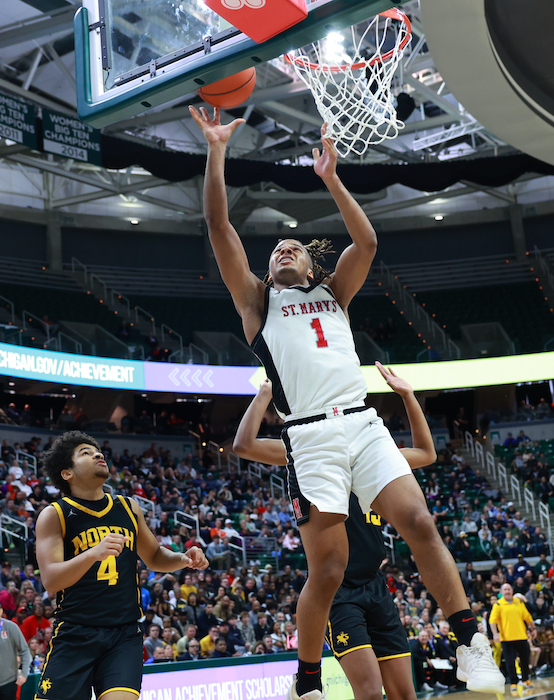 McKenney finished 8 of 11 from the field overall and made all 14 of his free-throw attempts. He added 10 rebounds.
McKenney finished 8 of 11 from the field overall and made all 14 of his free-throw attempts. He added 10 rebounds.
After the game, North Farmington head coach Todd Negoshian could only ask, “Can he graduate early?”
“He’s tough. He does a lot of things. He’s got the NBA style game right now with floaters and fadeaways. He’s so strong,” Negoshian added.
St. Mary’s (27-1) won its fifth Finals title and first since earning the Class B crown in 2000.
Ranked No. 1 for most of the year, the Eaglets navigated through that high expectation and all the way to the top of Division 1 after losing in a Semifinal last year.
“We’ve been dreaming about this a long time,” St. Mary’s head coach Todd Covert said. “This is a dream come true. It means everything.”
St. Mary’s was in control throughout, until late in the game when North Farmington made things interesting.
Trailing 46-26 with 6:27 remaining, North Farmington amped up its full-court pressure, created turnovers and did something it struggled to do prior to that point – make shots.
The Raiders cut their deficit to 59-50 with 1:46 remaining after a free throw by senior Landon Williams, making up much of the margin despite leading scorer Tyler Spratt fouling out with 3:27 left when St. Mary’s was up 55-39.
But that was as close as the Raiders could get, as McKenney essentially wrapped up the game by hitting two free throws with 12.9 seconds remaining to give the Eaglets a 63-52 lead.
St. Mary’s made 17 of 18 shots from the free-throw line during the fourth quarter.
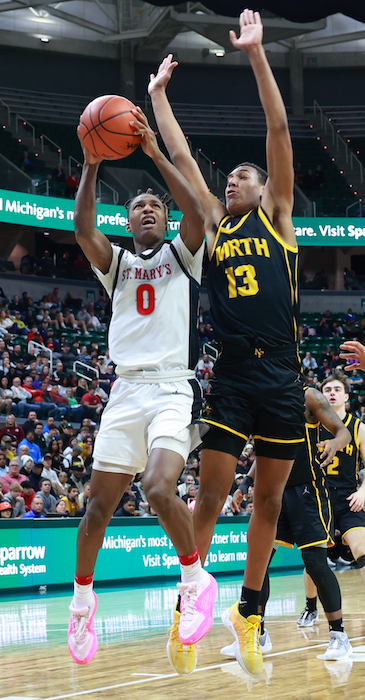 “That was the longest fourth quarter of my life,” Covert said. “It seemed like there was seven guys out there. But we weathered the storm, and that is what it’s all about.”
“That was the longest fourth quarter of my life,” Covert said. “It seemed like there was seven guys out there. But we weathered the storm, and that is what it’s all about.”
Spratt finished with 17 points, and Williams had 16 to lead the Raiders (24-3).
Saturday was North Farmington’s second championship game appearance after the Raiders faced a similarly elite player in Cassius Winston with Detroit U-D Jesuit in 2016.
“I thought we wore them down a little bit to where they ended up turning the ball over,” Negoshian said. “I thought we struggled to score at times. I think we got it to where we wanted to with them turning it over and keeping us right where we needed to be within striking distance. But we just couldn’t score at times offensively, and I think that was our downfall tonight.”
Trailing 25-19 at halftime, North Farmington cut the St. Mary’s lead to 25-22 with 6:56 left in the third quarter on a 3-pointer by Rob Smith.
But McKenney answered by scoring the next seven points, and then senior Andrew Smith drained a 3-pointer from the top of the key to give the Eaglets a 35-22 lead with 3:17 remaining in the third. McKenney then hit a jumper from the baseline to finish off a 12-0 run and push the lead to 15.
PHOTOS (Top) Orchard Lake St. Mary’s coach Todd Covert presents the Division 1 championship trophy to his players Saturday at Breslin Center. (Middle) The Eaglets’ Trey McKenney (1) gets to the basket for two points. (Below) St. Mary’s Sharod Barnes (0) gets a shot up with Dylan Smith (13) defending. (Photos by Hockey Weekly Action Photos.)

